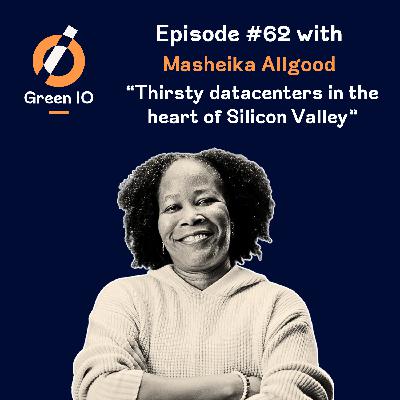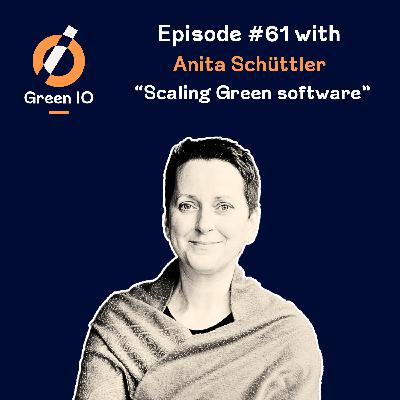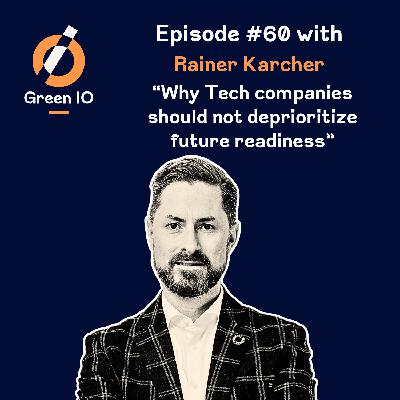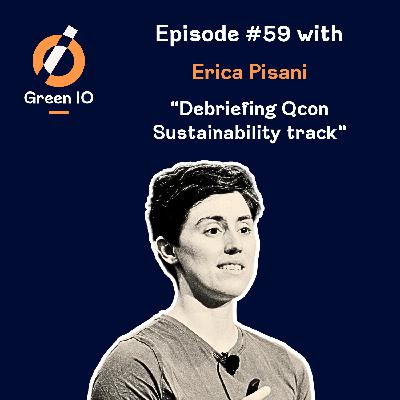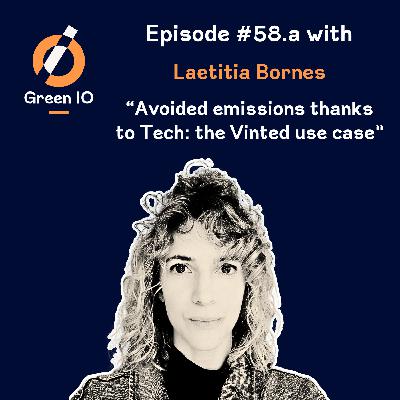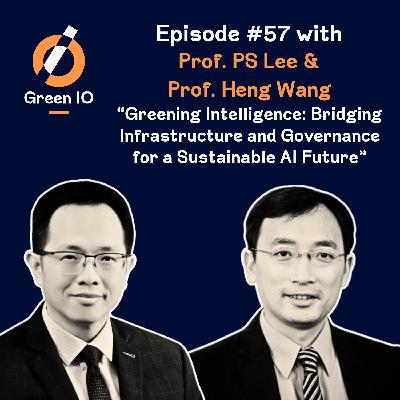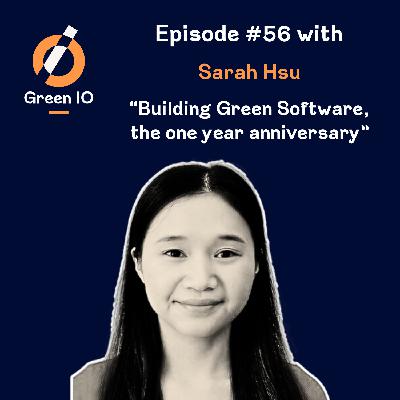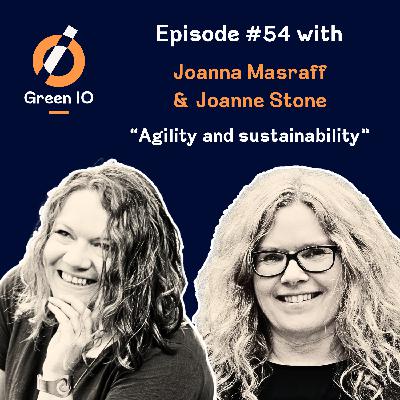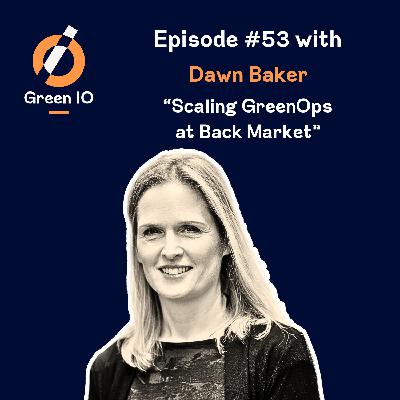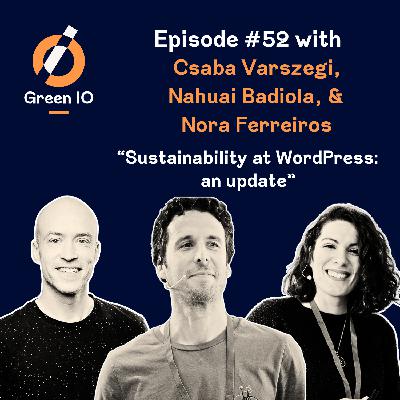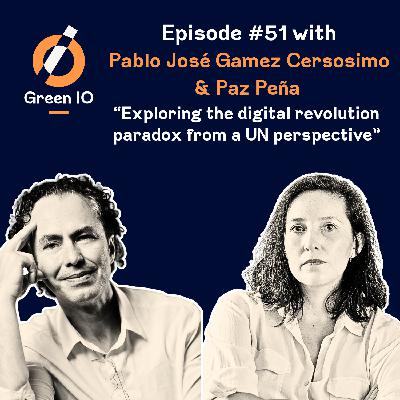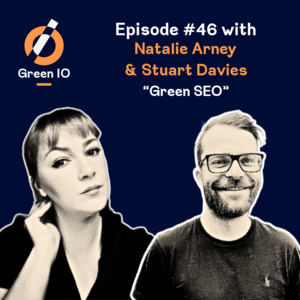#55 Decarbonizing Kubernetes with Flavia Paganelli and Niki Manoledaki
Update: 2025-03-25
Description
Did containerisation ship away our environmental responsibility?
Containers come with the promise of automation, scalability and reliability. The question is how to add sustainability to the list without breaking its other benefits. To talk about these challenges, Gaël Duez welcomes Flavia Paganelli and Niki Manoledaki, 2 experts in Kubernetes who are also pillars of the CNCF TAG Environmental Sustainability workgroup.
This episode might beat the record of acronyms: KEIT, CNCF, TAG … And yet Flavia Paganelli and Niki Manoledaki provided crystal clear explanations when they covered:
🍳 Why Kubernetes is a lot like a restaurant,
⛈️ The challenges with sustainability in cloud computing,
🛠️ The CNCF KEIT project,
🌱 CNCF’s reorg and what might happen to the TAG Environmental Sustainability,
💪 The power of open source communities,
And much more!
❤️ Subscribe, follow, like, ... stay connected the way you want to never miss an episode, twice a month, on Tuesday!
📧 Once a month, you get carefully curated news on digital sustainability packed with exclusive Green IO contents, subscribe to the Green IO newsletter here.
📣 Green IO Singapore is on April 6th and our next stop is in New York on May 15th. Every Green IO listener can get a free ticket using the voucher GREENIOVIP. A small gift for your huge support. 🎁
Learn more about our guests and connect
📧 You can also send us an email at contact@greenio.tech to share your feedback and suggest future guests or topics.
Flavia and Niki's sources and other references mentioned in this episode:
- FOSDEM 2025 talk: Kubernetes Emissions Insights: Turning Cloud-Native Green (Without Recycling Pods)
- KubeCon 2024 talk: Debunking Myths About Environmental Sustainability in the Cloud, Building a Greener CNCF Landscape
- CNCF TAG Environmental Sustainability
- CNCF Kepler project
- CNCF Prometheus
- CNCF Falco
- Software Carbon Intensity standard
- Boavizta API
- Aknostic
- GrafanaLabs
Transcript (auto-generated)
Flavia (00:00 )
I got to meet Nikki and all the people at the CNCF and I had the opportunity to go to KubeCon in Paris last year, it was amazing because it's not just about the who and the what, but it's about the people. So the energy that came out of that group, I like, want to be part of this. I want to, you know, join forces to build something together
Gaël Duez (00:16 )
Hello everyone, welcome to Green IO. I'm Gaël Duez and in this podcast, we empower responsible technologists to build a greener digital world, one bite at a time. Twice a month on a Tuesday, our guests from across the globe share insights, tools and alternative approaches enabling people within the tech sector and beyond to boost digital sustainability. And because accessible and transparent information is in the DNA of Green IO. All the references mentioned in this episode as well as the full transcript are in the show notes You can find these notes on your favorite podcast platform and of course on our website greenio.tech.
Cloud computing is nothing but material. It is just someone else's computer, as a popular quote says. Yet, using cloud services comes with its specific challenges for whoever is willing to seriously monitor its environmental footprint. And with the rapid adoption of cloud-based solutions, came extra layers of abstraction and remoteness with the bare-metal servers which ultimately compute and store the data.
One of these extra layers is the use of containers in the orchestration system. And they have been massively adopted in software engineering and cloud operation, the so-called DevOps. The software containers market is now a multi-billion US dollar industry with a double digit gross rate. Containers come with the promise of automation, scalability, and reliability.
Flavia (01:41 )
Thank you.
Gaël Duez (02:08 )
The question is how to add sustainability to the list without breaking its other benefits. To talk about these challenges, I'm glad to have two experts in Kubernetes, by far the most used container orchestration solution in the world.
Gaël Duez (02:24 )
Flavia and Niki who will be at CubeCon 2025 in London next week.
Gaël Duez (02:32 )
Flavia is CTO at Agnostic and a tech lead in the CNCF TAG Sustainability Screen Reviews Working Group. She has decades of experience in software engineering, and in her early days, she co-authored several O'Reilly books on AWS and also built an IoT platform She is originally from Argentina and now lives in Utrecht, Netherlands. Niki Manoledaki is a senior software engineer at Grafana Labs, where she's part of the platform engineering team but she is also an environmental sustainability advocate, keynote speaker and a community facilitator, starting with co-chairing the CNCF Environmental Sustainability Tags Green Reviews Working Group. She's based in Barcelona, Spain. And fun fact, reflecting the 2024 year for the Green IO Podcast, I was concerned by the lack of Spanish speaking guests in the lineup. And I've realized that in 2025, there are a majority so far. So I do hope that all this episode will help spark meaningful conversations, both in Spain and in Latin America. And at some point I will have to consider hosting a GreenOil conference in Barcelona, Or maybe in Amsterdam first.
Niki (03:48 )
Barcelona is a great place to host conferences. We do have the Mobile World Congress already happening. Actually, it's happening soon.
Gaël Duez (03:57 )
I also happens in...
Flavia (03:57 )
It would be nice when there's a train that goes from here to Barcelona, but they're still in progress.
Gaël Duez (04:05 )
I know. At least Paris is well connected by train, both from Barcelona, the Netherlands, UK, etc. So at least for Green IO Paris, it will be easy to join by train. That being said, hello, both of you.
Niki (04:19 )
Hello.
Flavia (04:19 )
Thank you for inviting us.
Niki (04:21 )
Yes, it's great to be talking with you both today.
Gaël Duez (04:23 )
Yeah, that's going to be a very interesting episode. And my first question might sound a bit dumb, but could you explain Kubernetes to our non-ops audience for a start?
Flavia (04:37 )
There's maybe an analogy that I read once and I thought it's pretty clear. If you think about a very busy restaurant where you have a lot of guests and you need to make a lot of food and you need to organize this so everything comes out. So there's enough food for everyone at the right time. can think about Kubernetes in that way. Kubernetes is the chef organizing all the cooks. You have maybe the containers can be thought of as the individual chefs. And each individual chef has to be in charge of making one specific dish. And then you have the nods, which are the kitchen stations for different purposes, like a kitchen station for grilling, another for baking, another for chopping. And then the pods are like a team of cooks working on one single order. like in Kubernetes, you need to handle load or scaling properly, right? You need to make sure that the orders go to the right people so that they don't get overloaded. You need to put more cooks on a specific dish which is more popular, et cetera. If one group of cooks have a problem with something, then there's always. Yeah, the authority and the organization to fix that. So concepts like scalability, reliability, you want your meal to get to the table and on time. Those are maybe nicely included in this metaphor.
Niki (06:34 )
And just remember for listeners who may be less familiar with the cloud, we're talking about hundreds of servers. So hundreds of computers and, how do you get the dish, which is the, application that a user is trying to, to access, available for hundreds if not thousands of users. So we need to make sure that th
Comments
In Channel


